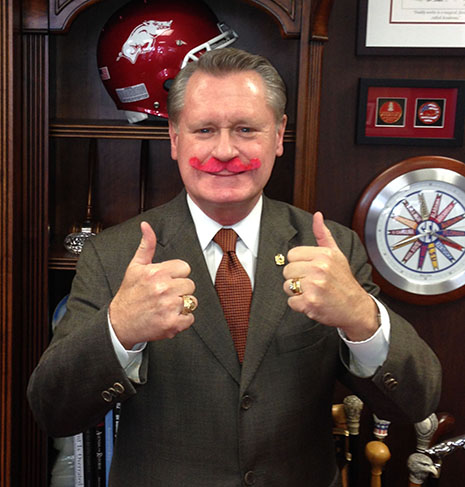FAYETTEVILLE, Ark. – Don W. Reynolds Razorback Stadium will become a sea of red when the Arkansas Razorbacks take on the Auburn Tigers on Saturday evening – a sea of red moustaches! In support of men’s health awareness, students in the Movember and No Shave November movements will be sporting red moustaches at the final game of the season in Fayetteville.
“This is a kick-off, kick-off,” said Danny Pugh, vice provost for student affairs. “What better place to raise awareness of men’s health issues than at a football game?”
November is the month when organizations such as the American Cancer Society hold men’s health awareness events. No Shave November and the Movember Movement are both infatuated with facial hair – or in particular with the moustache in the case of the Movember Movement – all to raise awareness of men’s health issues.
“We are calling this awareness campaign HOGstache, and will be using social media to promote the event and raise awareness of men’s health issues the entire month of November,” Pugh said. “We encourage men to take part by not shaving this month and posting their photos through social media using #HOGstache.”
On average, men die at a significantly younger age than women; average life expectancy for men is almost five years less than women (about 76 as opposed to about 81). There is not a biological reason for this, but there are quite a few possible causes that many men’s health organizations believe play a pivotal role in this phenomenon:
- Men’s lack of awareness and understanding about the health issues they face.
- Men not openly discussing their health and how they’re feeling.
- Men’s reluctance to take action when they don’t feel well, physically or mentally.
The University of Arkansas will help raise awareness of these issues in November and remind both men and women that it is important to seek help for any possible aliments, whether mental or physical. One way to raise awareness is by providing red moustaches to students during the Nov. 2 Arkansas Razorback football game against the Auburn Tigers.
Staff and students from the Division of Student Affairs will hand out red moustaches to all students sitting in the student section prior to the game, after they have been seated. Students will be directed to put the moustaches on for kick-off.
The university isn’t just promoting the month-long moustache growing, but awareness of the life threatening illnesses as well.
Testicular cancer is the most common cancer in males between the ages of 15 and 35; almost 8,000 men will be diagnosed with testicular cancer and 370 will die in 2013 alone. More than 238,000 men will be diagnosed with prostate cancer and approximately 30,000 men will die from the disease in 2013. Half of all men will be diagnosed with cancer in their lifetime, according to the American Cancer Society, and while not as common, around 2,240 men will be diagnosed with breast cancer at some point. More than 400 men will die from breast cancer in 2013.
While the American Cancer Society’s No Shave November is focused completely on men’s cancer issues and all facial hair growth as a means to promote awareness, the Movember Movement is focused more tightly on the might of the majestic moustache and yet more broadly on men’s health in general.
According to the Movember Movement, an estimated 13 million men, or 11.8 percent of all men over the age of 20, have diabetes; men who sit more than six hours a day have an 18 percent increased risk of dying from heart disease and a 7.8 percent increased chance of dying from diabetes compared with someone who sits for three hours or less a day. Movember also works to raise awareness of men’s mental health because more than 6 million men are diagnosed with depression each year, and nearly four times as many men commit suicide compared to women.
Many of these deaths are preventable or at least manageable and not life ending. Testicular cancer is one of the most curable forms of cancer and prostate cancer survival rates are also very encouraging, but survival depends on early detection. Approximately 30,000 men will die this year from these two diseases, and a great majority of them could have survived if they were diagnosed in time.
“College men are often fixated on strenuous physical exercise and give little thought or attention to the various other dimensions of health, particularly mental health. It is extremely important for young men to learn to cope with the stress of their lives and to learn how to assertively express the emotions of being human,” said Ed Mink, director of wellness and health promotion at the Pat Walker Health Center. “College men may benefit significantly from viewing health from a holistic perspective and appreciating that seeking balance is the key to personal well-being. Wellness and balance are achieved through getting adequate sleep each night, eating nutritiously, moderating alcohol consumption, engaging in service activities, and managing one’s time effectively.”
Contacts
Scott Flanagin, director, U of A Productions
Division of Student Affairs
479-575-6785,
